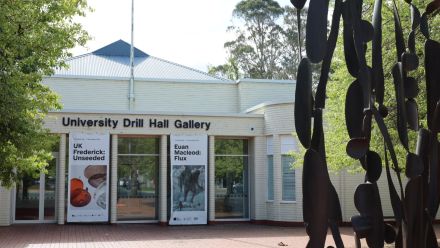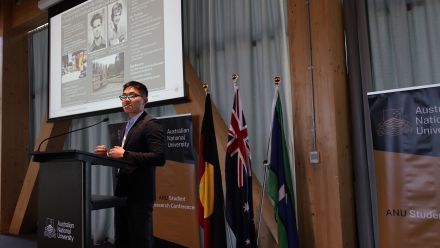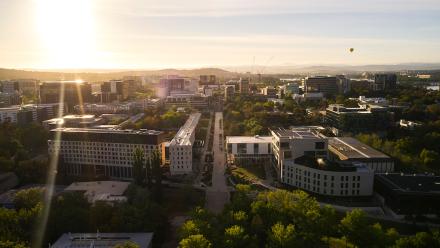Paul Hohnen
When were you a student and what did you study?
I did the combined Arts/Law degrees, commencing straight from school in 1969 and finishing in 1973. On the law side, I ended up specializing in international law, working under the late and great Jack Goldring and Bill Holder, who went on to work at the International Monetary Fund in Washington.
What are you doing now and how did you get there?
I suppose I am a sort of feral freelance diplomat posing as an independent consultant on sustainable development. Most of my time nowadays is spent in providing policy advice to UN and business organisations in Europe, where I am based, on sustainable business, finance and eco-innovation. I regularly chair sustainability related meetings, including at the Royal Institute for International Affairs, Chatham House, where I am an Associate Fellow.
Someone once quipped that David Bowie must have been my careers adviser. With all the changes, I suppose there‚Äôs something to that. I started off in 1974 by working for 15 years as an ¬ť∂Ļīę√ĹAV diplomat, serving in Paris, Fiji, Brussels and Sri Lanka. Then, in 1989, gamekeeper turned poacher, I took up a series of senior positions with Greenpeace International in Amsterdam, working first on climate change and then on the full range of environmental issues.
This wasn‚Äôt so much of a change as it might seem, since I was working with senior government officials and CEOs from around the world on various international agreements. From there, I went on to help set up the Global Reporting Initiative (GRI), the most widely used sustainability reporting framework. Finally ‚Äď in 2004 - I set up my own consulting firm, Sustainability Strategies.
From my perspective, there was a single career line in all this: the search for a more effective system of global governance to deal with issues vital to our collective future. I was just privileged to be able to pursue this with different employers.
How do you look back now on your time at ANU?
It was ‚Äď as Dickens put it in A Tale of Two Cities ‚Äď ‚Äú‚Ķ the best of times, it was the worst of times, it was the age of wisdom, it was the age of foolishness.‚ÄĚ
At the political level, the Vietnam War and the rise of Gough Whitlam’s Labor Party were challenging the complacency of the old politics. Students were encouraged to protest and think about better social, foreign and environmental policies. Women were beginning to play a more prominent role at all levels. The first moon landing, which I watched live in the Union Building, was clearly one of those frontier moments, where you just knew a new era was being ushered in.
Culturally, the influence of the post-WW2 European migrant community was percolating through in coffee shops, wines and restaurants. It‚Äôs easy to forget that before the 1960s and 70s, ¬ť∂Ļīę√ĹAV cuisine was pretty dire and the licensing laws even more so. As the saying went ‚Äėyou couldn‚Äôt get a parachute to open in Garema Place after 9pm.‚Äô Given that Garema Place was Hipsville Central at the time, that was saying something!
The ANU campus itself was wonderfully unique. A collection of modern and spacious buildings in a bush setting. The University’s founders, who included my uncle (Ross Hohnen, Registrar 1949-1975), had a vision of the ANU as both a national and international university. Pre-Steve Jobs, there was a sense of coherent design in both the intellectual and architectural framework.
When you look at some of the amazing leaders ANU has produced over the years, its record is one to be proud of.
What were your most memorable highlights?
On the academic side, there was the sense of privilege of attending the courses of a range of professors and lecturers who had an ability to convey both information and a passion for its relevance. Leslie Zines in the Law Faculty and Fred Langman in English Department spring to mind.
The demands of the Law Faculty didn‚Äôt give too much spare time, but I was involved in writing and performing in a number of university comedy reviews, with unlikely titles such as ‚ÄėWhatever Happened to Hieronymus Bosch‚Äô, ‚ÄėRockbottoms‚Äô and ‚ÄėRip-off‚Äô. These were inspired by a mix of Hellzapoppin and Monty Python humour, adapted to the local scene.
Writing and putting on these shows was one of the most enjoyable things I have ever done. Listening to ‚ÄėWally and The Wombats‚Äô playing at the Union Bar ‚Äď the first licensed university bar in Australia as I recall - is also up there near the top.
As a long-term expatriate, how do you see Australia through the lens of sustainable development? Is it still ‚ÄėThe Lucky Country‚Äô?
Australia is, without doubt, still a fantastic place to live. The weather, lifestyle and food are second to none. But therein lies part of the problem. It is sometimes all too easy to become complacent about our success.
With many others, I think Australia has too long traded on the ‚ÄėBig Farm, Big Mine‚Äô business model. Latin America has long since become the Big Farm and there are now Big Mines everywhere. The real growth now is in Big Technology and Big Data.
Here, sustainable development is re-shaping business models. A collision with history is in the making that may not play out well for the ¬ť∂Ļīę√ĹAV model. On the one hand, we are seeing governments and businesses worldwide reassessing global trends and fundamentally rethinking their approach to climate change and other sustainability issues. Recent decisions by some investors to drop coal miners from investment portfolios are straws in a wind that has been blowing for some time. On the other, we see a government seemingly bent on making a resource-based 19th century model still work. In this sense, Donald Horne‚Äôs original observation that ‚ÄėAustralia is a lucky country, run by second-rate people who share its luck‚Äô still remains prescient.
Do you have any advice to current students on career opportunities in sustainable development?
While ‚Äėsustainability‚Äô seems like a dirty word to the reigning political incumbency in Australia, I have no doubt that it is ‚Äď and will increasingly be ‚Äď the defining ‚Äėmega-trend‚Äô for the rest of history. Our current development model is changing natural systems dramatically and dangerously at a number of levels. In Darwinian ‚ÄėAdapt, Move, Die‚Äô terms, our options are clear. We need to find and transition urgently to a zero waste circular economy, where our use of resources and energy is ever more transparent and efficient. The students of today are perfectly placed to help put us on this path with a combination of new thinking, technologies, information sharing and economic models.


